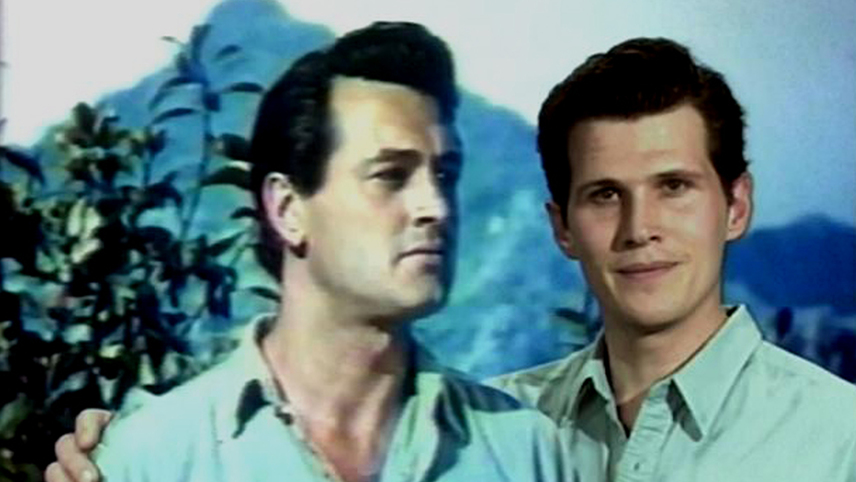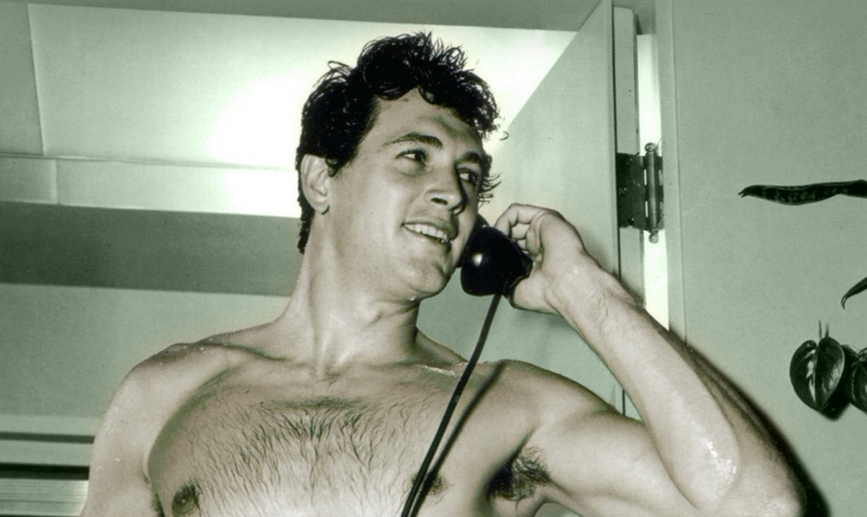Doc Corner: A comeback for 1992's 'Rock Hudson's Home Movies'
 Thursday, March 24, 2022 at 12:30PM
Thursday, March 24, 2022 at 12:30PM By Glenn Dunks

Subtext is a funny thing. The very idea of it revolves around the idea that some people just don’t get what’s being shown on screen. That for some, there’s nothing there at all. For others, there is a whole other world bubbling away told through code, gestures, innuendo, and subtlety. In today’s very connected world, this isn’t a good thing. Where once artists and scholars may have been revered for being the smartest person in the room—when did you last see anybody credited as an “intellectual” on television news anymore? —nobody today likes to be told “you just don’t get it”. How else could we have multiple online discourses at once about the artistic merits of Spider-Man: No Way Home versus (of all things) Drive My Car? Curiosity with art by the masses seems more or less gone completely.
Perhaps that is why Jane Campion’s The Power of the Dog has frustrated so many viewers. That film, like many Rock Hudson films, plays with the ideas of masculinity and femininity in ways that don’t immediately leap out. But once they do...
Which brings us to Rock Hudson's Home Movies.
Mark Rappaport’s classic 1992 queer essay doc lays it out very clearly. Not, as the title may suggest, a collection of Hudson’s private videos captured on tape at home and at play strung together to tell his life story. Rather, a wickedly entertaining collage of film clips and oh-so-‘90s intercuts with Eric Farr that collectively tell the story of Rock Hudson’s homosexuality through film. Eye opening in ways that really do make you question how anybody missed it in the first place, but smart enough to explain how (and maybe that they didn't miss it at all). In a way it reminded me of that anecdote Gore Vidal tells in The Celluloid Closet that everybody was aware of Ben-Hur’s homoeroticism except for its star, Charlton Heston.
This is not a film to watch if you’re wanting the sort of easily digestible bio-doc content that is too frequently churned out today. There are no experts or colleagues on hand to wax lyrical, nor does it claim any such attempt to tell his story up to his death from AIDS in 1985 in grand, sweeping emotional movements. Instead he takes inspiration from avant-garde artists of the '70s who emerged out of the age of VHS. In fact, so much of its impact comes from that very aesthetic; a rough and scratchy look that feels underground even today.

Rappaport plays fast and loose with the truth, in ways that would likely land him in hot water today. Eric Farr is employed to provide voice-over as if reading from Hudson’s own autobiography (no such thing exists, and it is entirely fabricated). But this isn't really any sort of film purporting to be an authorized take on the man. The entertainment found… It’s a compilation film, like a mixtape of songs recorded off the radio (or off another tape, the quality of clips as I've noted are almost public domain, early-videotape rough) and then cut up, remixed, and sampled. It invents and hypothesizes, like an early filmgoing memory of a shirtless and athletic John Hall diving from the top of a sailing boat in The Hurricane that feels so true you’d be forgiven for believing it until the movie’s conceit becomes truly apparent.
Rappaport is still making movies today. Access is difficult, but what I have read suggests they are of a similar vein. Titles like Color Me Lavender, Sergei/Sir Gay about gay Russian filmmaker Sergei Eisenstein, and something called The Vanity Tables of Douglas Sirk that is a title so fabulous I absolutely must hunt down (turns out it’s right there on The French Cinematheque archive). Even in dramatic features, like 1985’s Chain Letters, he seems to have very adroitly addressed America’s response to homosexuality and the queering of society. Rock Hudson and another actor’s scrapbook, From the Journals of Jean Seberg from three years later, are probably his most famous works. The former especially for how it so lovingly addressed Hudson’s homosexuality absent the sensationalist shock of how his death was portrayed in the media.
Rock Hudson’s Home Movies now has a comeback curtesy of Kino Classics. Like many queer documentaries of the time, its likely that most of its coverage came from local gay press and queer cinema books like Raymond Murray’s Images in the Dark (a must-own if you find a copy). Two of the four reviews on Rotten Tomatoes go to dead links, which would be disappointing if not so predictable. A New York Times review by Janet Maslin exists, though, and this video artwork suggests some other prominent reviews. The rest, likely have no online archive, which is a real shame. Queer films from this era were already being weeded out into those with crossover potential and those that did not. It’s great that a movie like this can return.
At one point, Farr refers to ‘himself’ as “Doctor Homorock and Mr. Machohyde”, and Rappaport’s witty editing highlights so well the way he was a man whose life was spent playing men who was hiding in plain sight. And within the very Hollywood constructs that built him into one of the biggest stars and sexual idols of his generation. Hollywood deliberately put him in situations they would never put other major stars (including bisexual ones) like Brando or Newman. Was Rock humiliated by having Tony Randall stare at his crotch? Or what about so blatantly playing queer opposite Doris Day? We’ll never know. But in Rappaport’s brisk (it’s only 63 minutes long) and entertaining film, his story becomes something a little less tabloid tragic and something closer to befitting his impact and significance as a man that queer audiences should embrace as he was never allowed to.
Release: Available on DVD and through KinoNow as of this week. For international audiences, it is available on Vimeo alongside three other Rappaport titles.
 Doc Corner,
Doc Corner,  Mark Rappaport,
Mark Rappaport,  Rock Hudson,
Rock Hudson,  documentaries
documentaries 


Reader Comments (4)
Such a great movie.
You can find most of Mark Rappaport's movies here: https://ok.ru/video/c5487305
I remember not liking this movie at the time for a very shallow reason -- i didn't think the actor playing "Rock" looked anything like him. But this write up was fascinating so i should try again.
Nat, that was initially an issue, but it wore away once I understand what it was doing and chose to see it as something of an alternate version of Rock had he been able to be who he wanted.